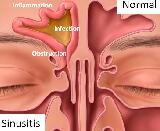Sinusitis
Nasosinusitis; Rhinosinusitis; Sinus infection

Sinusitis is inflammation of the sinuses resulting in symptoms. Common signs and symptoms include thick nasal mucus, a plugged nose, and pain in the face. Other signs and symptoms may include fever, headaches, poor sense of smell, sore throat, and cough. The cough is often worse at night. Serious complications are rare. It is defined as acute rhinosinusitis (ARS) if it lasts less than 4 weeks, and as chronic rhinosinusitis (CRS) if it lasts for more than 12 weeks. Sinusitis can be caused by infection, allergies, air pollution, or structural problems in the nose. Most cases are caused by a viral infection.
Bacterial biofilms are present on the mucosa of animals with sinuses experimentally infected with Pseudomonas aeruginosa. This is evidence of the presence of bacterial biofilms in an animal model of sinusitis. This model may serve as a means to study the efficacy and safety of pharmacologic and surgical treatments on the disruption and elimination of bacterial biofilms.
Organism species: Mus musculus (Mouse)
- Disease model DSI582Mu01 Mouse Model for Sinusitis In Stock
- Customized Service n/a Tissue of Sinusitis (If Necessary) Tissue Customized Service Offer
- Customized Service n/a Serums of Sinusitis (If Necessary) Serums Customized Service Offer
Organism species: Rattus norvegicus (Rat)
- Disease model DSI582Ra01 Rat Model for Sinusitis In Stock
- Customized Service n/a Tissue of Sinusitis (If Necessary) Tissue Customized Service Offer
- Customized Service n/a Serums of Sinusitis (If Necessary) Serums Customized Service Offer
Organism species: Cavia (Guinea pig )
- Disease model DSI582Gu01 Cavia Model for Sinusitis In Stock
- Customized Service n/a Tissue of Sinusitis (If Necessary) Tissue Customized Service Offer
- Customized Service n/a Serums of Sinusitis (If Necessary) Serums Customized Service Offer
Organism species: Oryctolagus cuniculus (Rabbit)
- Disease model DSI582Rb01 Rabbit Model for Sinusitis In Stock
- Customized Service n/a Tissue of Sinusitis (If Necessary) Tissue Customized Service Offer
- Customized Service n/a Serums of Sinusitis (If Necessary) Serums Customized Service Offer
Organism species: Canis familiaris; Canine (Dog)
- Disease model DSI582Ca01 Canine Model for Sinusitis In Stock
- Customized Service n/a Tissue of Sinusitis (If Necessary) Tissue Customized Service Offer
- Customized Service n/a Serums of Sinusitis (If Necessary) Serums Customized Service Offer


